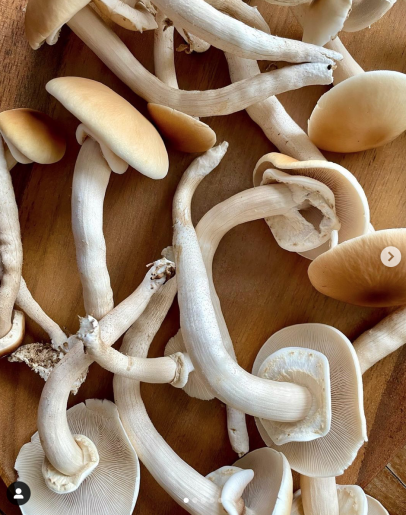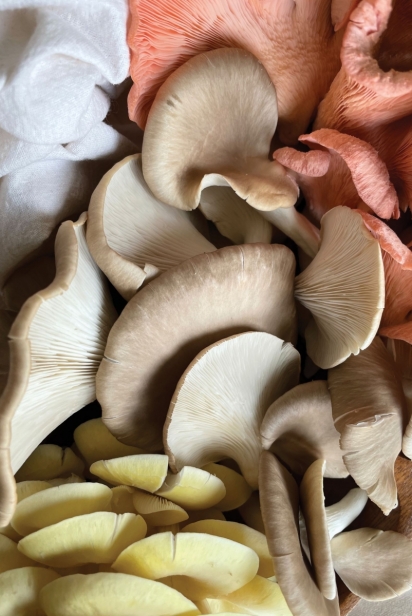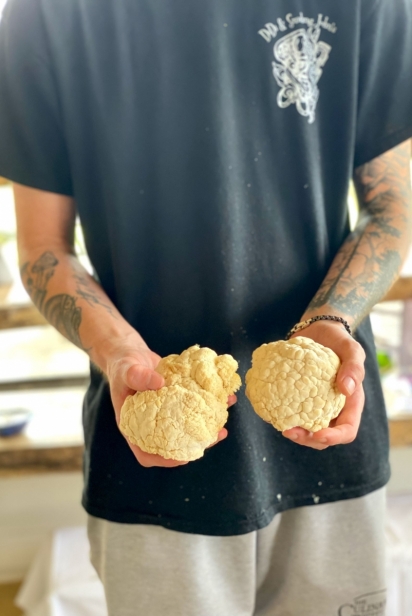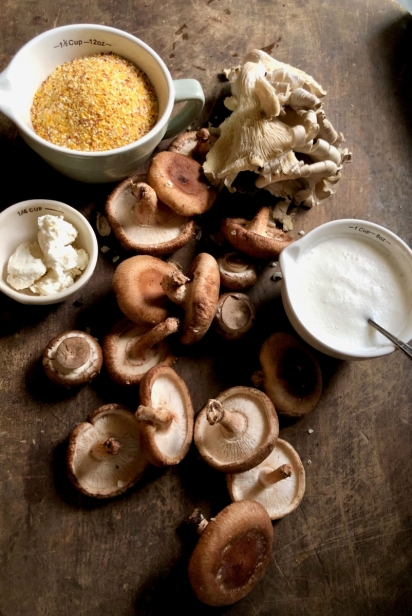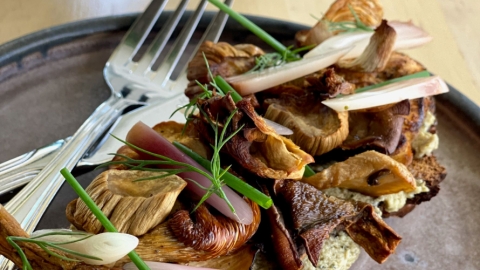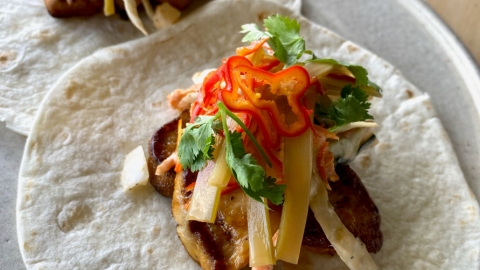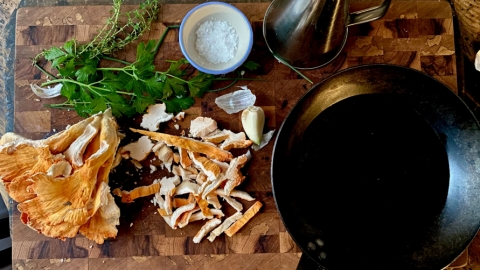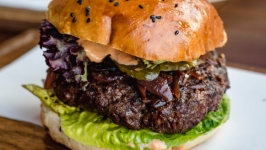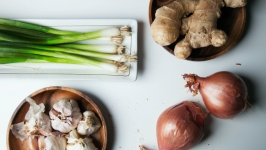Fantastic Fungi: 4 Mushroom Farms
Mushrooms are a thing. Not only for the crazy fact that they hold the earth together as shown in the documentary, Fantastic Fungi, but for eating too. They can heal you and feed you. Here we talk to farmers cultivating them and why. While each farm has its unique story and its individual style of growing mushrooms, all share a common ethos: produce healthy, sustainable food at the intersection of good ecology and good eating.
David Speegle loves when he gets a call about how to cook mushrooms. As the mushroom grower (and chef) for Cheekee Greens, a mushroom farm, his number is actually on the label of the mushroom package you can buy in Whole Foods, as well as other local markets, including Produce Place, Herban Market and Demeters Common. You see, David is passionate about not only mushrooms, but getting people to eat local, farm raised food. And he thinks the best way to cook that food is to ask the farmer who grows it. Hence why his name is on the package. “So, they call me. I say let’s get to know [the mushrooms]; cook them altogether simply with salt and pepper and taste the difference. My favorite way is to make a fall mushroom compote which is onions, apples, garlic, and mushrooms cooked down to a yummy, caramelized mixture that you can serve with anything -- on pizza, with steak, or in a pot pie or omelet.”
While mushrooms are literally older than good dirt, you would have been out of luck with scoring so much as a single cap of a locally grown mushroom in Nashville as recently as a decade ago. Nobody in town was cultivating them, and your mushroom choice was just those white buttons wrapped in plastic in the produce aisle. That is, until David Wells of Henosis watched Paul Stamets’s 2009 TED Talk, Six Ways Mushrooms Can Save the World. An MTSU music business grad, David realized mushrooms were a vastly underutilized resource in American agriculture. “I felt like I had gotten on the forefront of this now burgeoning industry,” he says. “We could eat our way to a healthy planet.” Not that it was that easy. No local mushroom community existed to help David get going, so he had to go DIY. From Vanderbilt’s biology department, he bought a used HEPA filter, a mechanical device that purifies air of any unwanted particulates, particularly unwanted fungi spores. Soon his bedroom was transformed into a mushroom cultivation lab. Fast forward to 2014, and Henosis -- Greek for “unity” or “oneness” -- was born, with an array of oysters, maitakes, and shiitake mushrooms.
Today, David is not alone, joined by other local mushroom farmers such as Possum Bottom Farms in Whitwell, Midway Mushrooms in Sewanee, Nashville Farmacy in Dover, and Cheekee Greens along the Bell’s Bend Conservation Corridor.
No doubt, the gourmet mushroom business is, well, mushrooming. “The industry in the US is seeing a massive upswing,” says Speegle. “Cultivating mushrooms helps farmers add subsidiary, year-round revenue to their farms.” The model sure works for John of Possum Bottom Farms. “Mushrooms are our only commercial crop,” he says. “Right now [August] it's peak season and we're producing around 600 pounds per week.”
Still, the challenges are considerable. “We spend loads of time calibrating CO2 levels, humidity, lighting, and temperature in an effort to produce the most beautiful, healthy, and tasty mushrooms we can,” says Daniel Fortner of Midway Mushrooms. “Some species are extremely sensitive to slight environmental changes and, say, in response to a couple degrees' increase in temperature, may develop long, stringy stems rather than the wide, meaty caps desirable for chefs.”
Sustainability
For those who persevere and learn to discern the mushrooms’ subtle whispers, the rewards are great. And not just for the farmers themselves, but for all of us. “Mushrooms are the lowest hanging fruit for locally sustainable food systems,” says Speegle. “Already incorporating waste systems like sawdust and woodchips, they’re a high nutrition, high protein, low cost, circular system of food to help feed people.” John Lawton of Possum Bottom Farms would certainly agree. “We use our mushroom compost to grow things like lettuce, carrots, broccoli, Brussels sprouts, apples, blueberries, raspberries, corn, tomatoes, etc., but we don't offer those for sale. That's purely for personal consumption. We call it ‘full circle farming.’ Nothing is wasted. Ever.”
And a no-waste policy is of the highest importance for Cheekee Greens, “We only deliver perfect caps to market and all other pieces and stems are dried to become powder.” That’s the good stuff, loaded with umami -- the 5th sense of taste. Lawton agrees, “if it goes in the crock pot, wok, skillet, or on the grill, it gets a healthy dose of mushroom powder. It's great with soups and stews, rice, noodles, stir fried veggies, grilled meats and fish, eggs, BBQ sauce, even popcorn.”
While the ecological and health benefits of gourmet mushrooms are extraordinary, they’re hardly beneficial if consumers don’t develop a taste for them. “A lot of people love mushroom flavor, but don't like mushroom texture,” says Lawton. “It also seems that a fair amount of people had a grandmother tell them mushrooms were poison. So, we spend a lot of time teaching folks about the nutritional content, the flavor pairings, and various ways to cook them.” Speegle concurs, “people think the mushrooms look beautiful, buy them, and then don’t know how to cook them.”
The key, according to Lawton, is to honor each type of mushroom’s distinct flavor and unique texture. For example, golden oysters have a tangy, citrus-like taste and pair well with chicken or fish while chestnut mushrooms have a rich, nutty flavor with peppery notes, blending best with red meats like beef or venison and dark green vegetables like broccoli, kale, and green beans. As for Lawton himself, he’s partial to shiitakes, preferring their bolder flavor. “Dry-roasted shiitakes take on a bacon-like flavor,” he says. “Meaty enough for kabobs or direct grilling.”
Lion’s mane is increasingly popular here in town with Subculture Urban Cuisine and Cafe and Union Station creating their versions of “Nashville Hot Lion’s Mane,” a vegan take on our now- famous hot chicken. In addition, Lion’s mane has a taste and texture similar to crab, making this distinctive, white mushroom the perfect choice for vegan “crab” cakes.
The Wild Ones
Even beyond cultivated mushrooms and powders and medicinal extracts, there is yet another class of edible fungi to savor: the wild ones. “There’s no such thing as cultivated morels, chanterelles, or chicken of the woods,” Alan Powell of Nashville Grown points out. The ecology is just too complex to replicate, even with our cutting-edge science. So, instead, these coveted edibles are enjoyed in-season only, harvested by local experts. “I have a couple of people who go out and forage,” Alan says. “So far this year, we have supplied chicken of the woods to Lockeland Table and The Catbird Seat and chanterelles to Richland Country Club and Lou.”
Where to Find
Where can you get cultivated mushrooms? Cheekee Greens has their Lion’s Mane and assorted packaged shrooms at Produce Place, Herban Market and Demeters Common as well as Whole Foods.
Most of the mushroom farms mentioned here can be found at a farmers market, but it’s best to check their websites.
On Cooking Mushrooms
You want to cook mushrooms like a piece of fish. Place them in a hot pan with a combination of extra virgin olive oil and canola oil and leave them alone. Then flip them and let them cook and get crispy on both sides. Never wash them with water or soak in water. Mushrooms are like little sponges and will easily get waterlogged.
Where To Buy Mushrooms
Midway Mushrooms: Shiitake, Oyster, and Lion’s Mane are their bread and butter.
midwaymushrooms.com
Possum Bottom Farms: Shiitake, Blue Oyster, Elm Oyster, Golden Oyster, Black Pearl King Oyster, Chestnut, and Lion’s Mane varieties.
possumbottom.com
Cheekee Greens: Chestnut, Lion’s Mane, Maitake, Nameko, Oyster, Shiitake, and Wine Cap mushrooms, and mushroom powder
Supplement Varietals: Cordyceps, Lion’s Mane, Reishi, and Turkey Tails
cheekeegreens.com
Henosis:
henosismushrooms.com
Nashville Farmacy: supplements, extracts, honey, and oils
nashvillefarmacy.com


